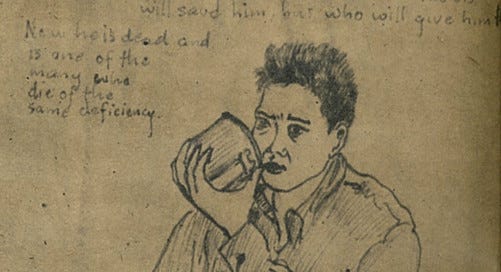Today in History: Death Duties in Capas
Death and Burial in Capas Concentration Camp

April 21, 1942: a young Filipino officer in Capas, Tarlac, Felipe Buencamino III, records death duties. “F.C. Camp” stands for “Filipino Concentration Camp”:
Capas, Tarlac
F.C. Camp
Joined the grave-detail. We buried those that died this morning. Some of the graves yesterday were not dug deep enough. The bodies buried yesterday have been unearthed. The sand here is clayish because the cemetery is too near the river.
One of the boys we buried had a little piece of paper in his pocket. We opened it. It was the copy of a citation awarding him for exceptional bravery in an attack in Bataan.
(later)
Most of the boys in the camp are very depressed. They feel that “it will be a long time before we are released.”
Many are disappointed with our leaders in Manila. “All they know is to give speeches and make promises!” “Why don’t they resign from their posts if the Japs do not want to release us?”
Personally, I don’t think we will be released until all resistance in the islands has ceased. The Japs are afraid that when we are strong enough, we might start trouble again. Besides, they want to make up for the thousands of Japs who died in Bataan. The more among us that die here, the better for them.
(later)
Collecting impressions of everyone here about Bataan. It will make a book someday. Am also listening to everybody’s experience during the long walk from Bataan to this prison camp.
Apparently, the Japs gave every barch more or less the same kind of treatment, although some groups got very much worse treatment.
Consensus is that at least 15,000 died during that bloody march. Japs bayoneted men who could not keep up with the pace. Very little rest was given. Some were shot for trying to escape.
For example, there was an old soldier who took off his shoes because of blisters. Suddenly, one of the Japs clubbed him on the head. A relative of the clubbed man charged at the Jap. Both fellows were tied to a tree and slowly tortured. Their shouts could be heard by all those around, but no one was allowed to look.
Someone said that in Orani, everybody was searched. One fellow was found with Jap money in his pocket. The Jap soldier said in broken English: “Why you have Jap money? So maybe you take that from dead Jap soldier! O.K… Now you die!” And he was bayoneted in the lungs. According to the one telling the story, the Jap money was given by a Japanese officer who bought the boy’s watch.
After such exchange of stories, everybody ends the conversation with the remark: “Someday we will get even, someday.”
Very few boys in camp think that Corregidor will be able to stand. Quite a number are disappointed at America. They ask: “Where is the convoy she promised?” The great majority believe, however, “in due time, when American factories get going, Japan will be beaten.”
Must stop writing. It’s getting dark. We have no lights here.
Two boys are humming a duet. Kundiman again. I like kundimans. They are soft, plaintive, full of feeling, lonely, very lonely.
They have stopped singing. Somebody in the group is weeping. I wonder why.
(later)
Just ate another camote. Superb.


